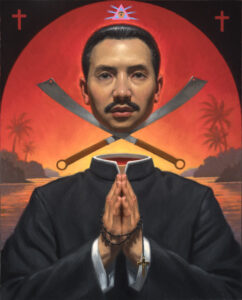Editors Note: Timothy Murphy, one of America’s finest lyric poets and a Catholic convert, died on June 30, 2018 in his home in Fargo, North Dakota. Dana Gioia is the author of six books of poetry, the Poet Laureate of California, former chairman of the National Endowment for the Arts, the Widney Professor of Poetry and Culture at the University of Southern California, the author of three opera librettos, and the winner of many prizes and awards, including Notre Dame’s Laetare Medal. We publish this excerpt from Gioia’s preface to Timothy Murphy’s latest book Devotions, with his permission:
Devotional verse has always played a significant role in Christian practice, though congregations customarily think of the texts less as poetic than liturgical. Much of the Old Testament is written in verse, and this poetry is ubiquitous in Catholic liturgy, including both the Mass and Divine Office. Monastic worship centers on communal chanting of the Psalms. The many manuals of devotionals, therefore, almost inevitably include Biblical verse in their daily selections. Literary devotional poetry seeks to create new verse to aid the spiritual needs of contemporary believers. The greatest devotional poets in English, such as Herbert and Vaughan, were prolific, writing verse that engaged the reader in every possible spiritual and emotional posture—joy, thanksgiving, anxiety, fear, hope, and sorrow—as well as meditations suitable to the major Christian feasts.
Timothy Murphy’s Devotions revives this major but neglected poetic genre with variety and amplitude. In over two hundred short poems, Murphy explores the vicissitudes of modern spiritual life. Some of the poems are inspirational, celebrating the joyous mysteries of faith. Others confront the sorrows and failures of contemporary life—presenting unvarnished the painful dramas of sin, despair, repentance, and redemption. Murphy celebrates the saints, but he has not forgotten “the battered, the drunkards, the sinners,” among whom the poet still numbers himself. In these poems the drama of redemption is not abstract but personal.
The great tradition of devotional verse in English has mostly been Protestant. Among the “Metaphysicals,” only Richard Crashaw was Catholic (though John Donne was raised in the Church of Rome). Consequently, the inwardness and individual focus of Calvinism shaped the forms of these devotions. While Murphy sometimes meditates on the solitary soul before God, he characteristically sees Christianity from a Catholic perspective. For him, Christianity is primarily a mystical community, composed of both the living and the dead united by Christ through the sacraments. His themes, though sacred, are remarkably diverse. The book contains meditations on the Psalms, sacraments, major feast days, priesthood, saints, and the daily sacrifice of the Mass. There are even some comic poems for those who forget how Jesus was not above instructing his apostles through humor. Devotions is a brave book that recaptures a legacy that has nourished both worship and literature. These are genuine poems rooted in a passionate encounter with the divine. I predict they will find many devoted readers.
Timothy Murphy’s latest book Devotions (published March 2018) may be purchased here. It is not his last book, as the many poems he created and left to us during his dying year will be published by North Dakota State University Press. To hear Timothy read two new poems published by Catholic Arts Today , scroll to the bottom of “Seventh Anniversary: An Ode,” and “Directed Dreaming: A Double Sonnet”.




